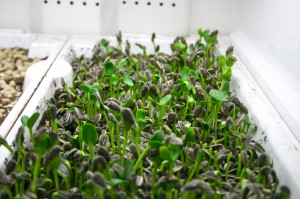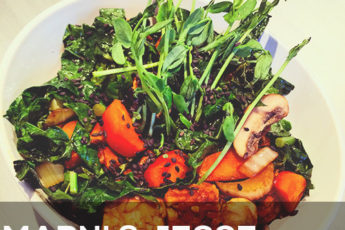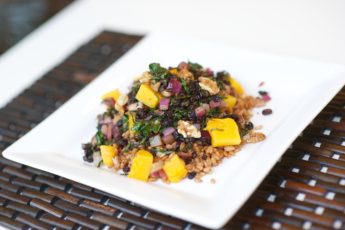Why should I eat more sprouts?
If you aren’t already including sprouts in your diet, you definitely should be! Sprouts are germinated seeds of different plant foods. We love spouts as they are quick, easy, and inexpensive. Eating them raw is best, but if you would like to cook them, sauté them very lightly, fast blanch or steam, as nutrients will be lost if overcooked. Sprouts can be added to all kinds of dishes from salads, to stews, soups and wraps. Don’t forget that they can be juiced as well, or thrown in a smoothie!
Nutrient-dense: The word nutrient-dense means that there is a concentrated amount of nutrients relative to calories in a food. Sprouts are high in fibre, enzymes, minerals, vitamins, essential fatty acids, and also low in calories. The process of sprouting increases the availability of all these beneficial nutrients for your consumption. That means there are way more enzymes in sprouts than in uncooked foods.
Health benefits: Being nutrient dense, you don’t need a large quantity to take advantage of the nourishing properties. Sprouts are immunity-boosting, decrease your chance of anemia (many sprouts are iron-rich), reduce LDL-cholesterol due to fibre binding with bile in the GI tract, and reduce risk of cardiovascular disease and constipation. In addition, you are likely to have more energy, feel fuller, and potentially lose weight!
Brighter, Clearer Skin: Sprouts can benefit the appearance of your skin significantly. By consuming them on a regular basis, your skin will glow, be hydrated, and be clearer of acne or other skin problems. High levels of omega 3 fatty acids in sprouts are a significant factor in decreasing inflammation and development of acne and other skin problems.
Strong, Shiny Hair: For someone who is struggling with hair loss, sprouts are a great boost, especially alfalfa sprouts. This is because they are rich in vitamins and minerals such as A, B complex, E, zinc, magnesium, potassium and iron which support healthy hair growth. The omega 3 fatty acids in sprouts also nourish the hair follicles and prevent hair from becoming dull and brittle.
High in Protein: Worry about getting enough protein? Throw some sprouts on that! This is because sprouts contain a high dose of protein and the quality of the protein increases compared to the unsprouted nuts and seeds.
Bioavailability of minerals and protein: The body can more easily absorb and utilize the nutrients in sprouted foods. Minerals bind to protein in the seed, which makes them easier to absorb in the body. For instance, the body can utilize iron, zinc, and vitamin C from sprouts with little difficulty compared to the unsprouted foods.
Digestion: You will be able to digest beans without all that difficulty you normally experience if they are sprouted. How great is that? This is because sprouting breaks down a seed, creating less work for your body. For someone who has problems digesting foods or food intolerances, sprouting may improve their digestion.
Locally grown: What’s more locally grown than sprouting your own foods in your home! You are helping the environment, and you can be certain that you are not consuming pesticides, food additives, and other unwanted chemicals or additives.
Quick and easy: Unlike gardening, you can harvest seed sprouts within 3 to 7 days, which allows you to eat them frequently.
The benefits of sprouts are so numerous, they’re a great way to slip healthy raw foods into your diet on a day to day basis to nourish your body and get glowing and vibrant! We love seeing this beauties peeking through the soil of our Urban Cultivator in the studio.
Sprouted Hummus
Ingredients
3⁄4 cup chickpeas sprouted (for two days)*
1⁄4 cup tahini
2 tablespoons olive oil or flax oil
2 tablespoons lemon juice or orange juice
1 clove of garlic or 1 piece of ginger
1⁄2 teaspoon sea salt
1⁄4 cup water to thin out – if necessary!
Optional: 1 tablespoon or more of parsley, cumin, dill, basil, kelp or dulse
* To sprout: soak chickpeas in enough water to cover for 8-10 hours. Then drain the water,
rinse the chickpeas and place in a colander or large bowl. Rinse and drain again after 12 hours
and continue to repeat until the chickpeas begin to sprout a shoot!
1. Sprout the chickpeas for 2-3 days, until the shoots grow long. Remember to rinse twice a day to prevent mold.
2. Chop the garlic and squeeze the lemon juice.
3. Process the citrus juices with the ginger or garlic, oil, sea salt and spices in a food processor.
4. Add the chickpeas and tahini and process to desired consistency.




